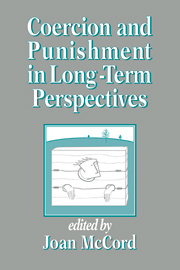Book contents
- Frontmatter
- Contents
- List of contributors
- Acknowledgments
- 1 Introduction: coercion and punishment in the fabric of social relations
- I Mental health, coercion, and punishment
- II Family socialization practices and antisocial behavior
- III Aggression and coercion in the schools
- 11 The impact of peer relationships on aggression in childhood: inhibition through coercion or promotion through peer support
- 12 Classroom seating and juvenile delinquency
- 13 Social skills training and aggression in the peer group
- 14 Early adolescent social influences on delinquent behavior
- IV Deviance, crime, and discipline
- V Measuring and predicting in studies of coercion and punishment
- Name index
- Subject index
13 - Social skills training and aggression in the peer group
Published online by Cambridge University Press: 29 September 2009
- Frontmatter
- Contents
- List of contributors
- Acknowledgments
- 1 Introduction: coercion and punishment in the fabric of social relations
- I Mental health, coercion, and punishment
- II Family socialization practices and antisocial behavior
- III Aggression and coercion in the schools
- 11 The impact of peer relationships on aggression in childhood: inhibition through coercion or promotion through peer support
- 12 Classroom seating and juvenile delinquency
- 13 Social skills training and aggression in the peer group
- 14 Early adolescent social influences on delinquent behavior
- IV Deviance, crime, and discipline
- V Measuring and predicting in studies of coercion and punishment
- Name index
- Subject index
Summary
Longitudinal research indicates that aggressive children are at risk for continuing the coercive lifestyles that engendered their aggressive problems. Children who are aggressive at age 8 have a high probability of extending their aggressive behavior patterns into adulthood. Disruptive and bellicose children have a tendency to become adults who are at risk for marital conflict and child abuse, to engage in criminal behavior, and to become addicted to drugs and/or alcohol (e.g., Farrington, 1991; Huesmann, Eron, Lefkowitz, & Walder, 1984). Although aggressive behavior patterns are remarkably stable (Loeber, 1990; Olweus, 1979), they are expressed differently at various stages of development and are sensitive to different risk factors during those stages (Loeber, 1990). The interaction of individual characteristics with risk factors seems to determine the developmental path for aggressive children. In other words, children's behavioral, affective, and cognitive processes likely affect and are affected by parental and peer influences to direct the life course (Loeber, 1990). In this chapter, we focus on the role of peers in maintaining and exacerbating the developmental course of aggressive children. Peer influence is examined in the context of an intervention designed to interrupt the maladaptive trajectory of aggressive children by improving peer interactions.
Developmental course of aggressive children
Peer relations have been identified as a salient risk factor in the development of aggressive behavior problems. There is growing evidence that peer interaction plays multiple roles in social, cognitive, and moral development.
Information
- Type
- Chapter
- Information
- Coercion and Punishment in Long-Term Perspectives , pp. 213 - 228Publisher: Cambridge University PressPrint publication year: 1995
Accessibility standard: Unknown
Why this information is here
This section outlines the accessibility features of this content - including support for screen readers, full keyboard navigation and high-contrast display options. This may not be relevant for you.Accessibility Information
- 14
- Cited by
